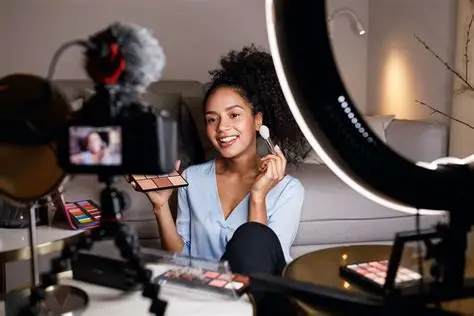There was a time when getting a song to blow in Nigeria followed a clear formula: radio spins, Alaba market distribution, and maybe a co-sign from a top DJ. But in today’s music economy, those rules barely apply. The gatekeepers have changed, and so has the pipeline. In 2025, the real plug isn’t a radio presenter or label PR executive, it’s a social media influencer. The power to make or break a record has shifted from traditional promotion channels to the timelines, For You pages, and comment sections of Nigerian youth culture.
Influencers have become the new music promoters, rewriting how Afrobeats lives, spreads, and monetizes. Their role isn’t just secondary; it’s foundational. Artists now build rollout strategies around influencer engagement, and labels allocate budgets not for TV ads but for trend campaigns. A new kind of symbiosis has emerged between music and social media, one where a viral soundbite can replace months of marketing, and a 15-second dance challenge can turn a no-name artist into a streaming success overnight.
The change didn’t happen overnight. It began with the explosion of TikTok and Instagram Reels around 2020, but what we’re seeing now is a matured ecosystem one that fully integrates influencers into the music industry. When an artist drops a single today, the rollout is incomplete until influencers get involved. Not just any influencers, either each has a defined lane. There are comedic creators who remix snippets into skits, dancers who build trends around the hook, lifestyle influencers who soundtrack their vlogs with the track, and fashion tastemakers who use the song to set a mood. Together, they form a distributed marketing machine that no single label could replicate on its own.
In Nigeria, this system has become both an opportunity and a dependency. Artists like Ayra Starr, Rema, Asake, and Odumodublvck have all benefited from organic influencer traction but they’ve also learned that virality is unpredictable currency. For every song that catches fire on TikTok, dozens vanish into the algorithm’s abyss. The influencer economy has made promotion faster but also more volatile, rewarding songs that are catchy or memeable rather than deeply crafted. Still, in a digital market where attention is the most valuable commodity, influence has become the ultimate marketing skill.
What’s striking is how influencer culture has democratized exposure. You no longer need radio connections or label funding to be heard. An upcoming act can DM ten micro-influencers, get them to use a song snippet creatively, and within days find themselves trending. Platforms like TikTok, Instagram, and Triller have become informal A&R spaces where the audience does the testing in real time. Even major record labels now monitor what’s moving online before deciding what songs to push officially. The streets still talk, but now they talk through content.
The rise of influencers has also birthed a new type of star. Figures like Enioluwa, SoftMadeIt, and Priscilla Ojo have become cultural conduits between fashion, comedy, and music. Their influence doesn’t depend on musical expertise but on relatability and visibility. A song might not sound like much in a studio setting, but once it appears in a 10-second influencer clip that millions of young Nigerians interact with, it gains context and emotional connection. The audience doesn’t just hear the song they see themselves in it.
Yet, this shift hasn’t come without criticism. Many industry veterans argue that the influencer takeover has watered down the art of promotion. Where radio and PR once focused on storytelling, influencer campaigns often focus on virality at all costs. There’s a growing sense that songs are now being made for social media rather than from genuine inspiration. Choruses are engineered for challenges, hooks for memes, and lyrics for caption use. In a way, influence has replaced artistry as the new metric of success. The phrase “make it TikTokable” has become as common in studio sessions as “make it a hit.”
Still, it’s impossible to ignore how much this new model has fueled Afrobeats’ global reach. Influencers aren’t just local promoters; they’re international exporters. Nigerian dance trends routinely cross into global pop culture, and even Western artists now chase Afro-influencer validation for authenticity. When a Nigerian TikTok creator dances to a new single, that clip can end up in Brazil, London, or Los Angeles within hours. The influence economy has made Afrobeats not just a sound but a shared digital experience.
The economics are also evolving. Top influencers now charge rates comparable to traditional media placements. Brands and labels include them in budgets as key campaign pillars. For artists, this creates both pressure and opportunity. A viral influencer campaign can push a song into chart territory, but it can also drain budgets and create unrealistic expectations. Many acts now rely entirely on influencer-driven buzz, neglecting long-term fan engagement or performance value. It’s the classic Nigerian hustle story fast, flashy, and risky.
But amid all the chaos, one truth remains: influencers have made the Nigerian music industry more visible, interactive, and fan-driven than ever before. Their influence has blurred the lines between marketing and culture. The audience no longer just consumes music they participate in it, remix it, and amplify it. Every trending sound, every skit, every dance step contributes to the narrative of what Afrobeats represents: adaptability, innovation, and community energy.
What’s next is uncertain. The influencer wave is still rising, but cracks are beginning to show. Oversaturation and content fatigue are real. Audiences are starting to see through forced trends and sponsored posts that lack authenticity. The challenge for both artists and influencers will be sustainability how to keep influence organic when everyone is chasing the same virality. But even if the platforms change, the power dynamic likely won’t. Influence, once earned through music quality alone, now travels through digital charisma and timing.
For Nigerian music, this evolution is both a blessing and a cautionary tale. It’s proof that the industry can adapt, that creativity always finds new distribution. But it also warns of a world where sound follows trend instead of leading it. Still, in the spirit of Afrobeats where chaos and genius coexist perhaps this balance between art and algorithm is exactly what makes it thrive. The stage has moved from Eko Hotels to Instagram Lives, from club DJs to TikTok timelines. And in this new era, the most powerful promoter isn’t a PR manager or radio plug, it’s whoever can make the world dance in 15 seconds.


Leave a Reply